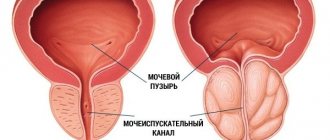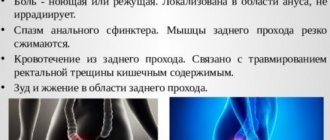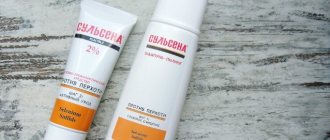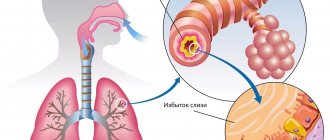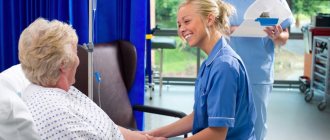Anal itching is a fairly common condition in which a person suffers from persistent itching in the anus. Many suffer from itching in the anus for almost years, embarrassed to see a doctor or not knowing which specialist can help in this case.
MedicCity proctologists are specialists who will help you with any proctological problems and diseases, be it itching in the anus or hemorrhoids, paraproctitis and fistula. There are no “frivolous” or “unimportant” problems when it comes to your health! Be sure to consult a doctor if you are concerned about any symptoms of proctological diseases!
1 Consultation with a proctologist
2 Consultation with a proctologist
3 Consultation with a proctologist
Types of anal itching
In proctology, a distinction is made between primary and secondary anal itching.
Primary anal itching is an itching for which scientists have not yet identified any apparent causes.
Secondary anal itching may appear as one of the symptoms of some diseases. For example, a similar condition may accompany the following diseases:
- haemorrhoids;
- chronic anal fissure;
- helminthic infestation;
- proctitis, proctosigmoiditis and other intestinal diseases;
- inflammatory diseases of the intimate area;
- fungal infection of the anal area and perineum;
- burn or mechanical injury to the anus (for example, if there is a foreign body in the intestine).
Intestinal diseases
Intestinal pathologies are the most common cause of anal scabies. Diseases of the lower gastrointestinal tract include:
- hemorrhoids external/internal;
- genital condylomas;
- cracks and mechanical damage;
- oncological tumors.
With pathologies of the rectum, the symptoms will be constant and increasing. In addition to itching, sharp stabbing pains that intensify in a sitting position and when going to the toilet can be bothersome.
What diseases cause anal itching?
Anal itching may be accompanied by the following diseases:
- proctological direction (proctitis and proctosigmoiditis, hemorrhoids, chronic paraproctitis, cryptitis, insufficiency (incontinence) of the anal sphincter);
- gynecological direction (PID);
- viral direction (genital warts);
- fungal diseases (actinomycosis, thrush);
- bacterial diseases (helminthic infestations, pubic lice, scabies);
- skin diseases (psoriasis, seborrhea, inflammation of the sweat glands, atopic dermatitis, eczema, lichen planus);
- diseases with metabolic disorders (diabetes mellitus, liver failure, pancreatitis).
What can most often be confused with perianal infectious dermatitis?
Due to the fact that knowledge of this pathology is still insufficient among doctors, the diagnosis is often delayed (according to foreign statistics, on average by six months)
Instead of PID, diagnoses such as:
- candidiasis - fungal inflammation of the skin
- enterobiasis (pinworms)
- anal fissure
- psoriasis
- eczema/atopic dermatitis
- Crohn's disease
- diaper dermatitis
- haemorrhoids
- perianal allergy
- dysbacteriosis
Symptoms of itching in the anus
Incessant itching in the anus at night - what could be worse? A person may experience insomnia, nervousness, and depression. The skin around the anus becomes rough, covered with abrasions, and begins to bleed. If deep abrasions become infected, inflammation may begin.
Acute anal itching usually begins unexpectedly and abruptly. Maceration (wetting of the skin), irritation, and scratching appear in the anal area.
Chronic anal itching may begin unnoticed but becomes worse over time. The skin around the anus becomes dry and inflamed. There may be no characteristic pigmentation. Usually, with chronic anal itching, scratching does not occur.
Prolonged anal itching can lead to bacterial infection of the skin, the appearance of eczema, and the wounds begin to hurt and bleed. Therefore, it is better to come for a consultation with a MedicCity proctologist at the first symptoms and under no circumstances self-medicate! After all, such itching is usually a kind of “bell”, a sign of the presence of serious diseases in the body.
1 Preparation for anoscopy
2 AMI HAL-Doppler II - device for the treatment of hemorrhoids
3 Preparation for anoscopy
How to determine the cause?
With a characteristic appearance, additionally taking a culture from the inflamed skin helps. This method helps to identify the microbe that caused dermatitis, as well as to clarify its sensitivity to antibiotics.
A rapid antigen test is available to confirm group A streptococcus .
You may have already seen how pediatricians and otolaryngologists use it to urgently resolve the issue of prescribing an antibiotic for acute inflammation in the throat.
Formally, the test according to the instructions is only for the throat, but many people are already actively using it for PID. For group A streptococcus, the sensitivity of the method is 77.9-98.0%, but remember that sometimes other microbes also cause PID.
Causes of anal itching
Causes of anal itching can be:
- lack of personal hygiene;
- excessive passion for water procedures;
- excessive dry skin in old age;
- increased skin moisture as a result of increased sweating of the skin or frequent bowel movements;
- using a hard washcloth, hard soap and rough toilet paper;
- the use of certain medications, hemorrhoid remedies, gels, ointments and birth control suppositories;
- frequent inclusion of hot and spicy foods in the diet;
- depilation of hair in the anal area.
Anal itching can appear as a consequence of neurosis ( neurogenic anal itching) or after taking medications ( iatrogenic anal itching) .
The appearance of idiopathic anal itching is associated with a decrease in the contractile function of the sphincter and skin irritation due to mucus released from the rectum.
Gynecological and urological diseases
Women may experience anal itching due to intimate herpes, vaginitis and disruption of vaginal secretion. In men, the causes of itching can be: prostatitis, furunculosis, urethritis. In addition, discomfort in the anal area is provoked by various sexually transmitted infections:
- chlamydia, trichomoniasis;
- primary syphilis;
- gonorrhea, mycoplasmosis.
Diagnosis of anal itching
Diagnostic examination includes the following methods:
- examination of the perianal area (pay attention to the presence of scratching);
- finger examination;
- endoscopic examination of the colon (sigmoidoscopy and colonoscopy);
- immunological blood test.
1 Diagnosis of anal itching
2 Colonoscope
3 Immunological blood test
When diagnosing the disease, it is necessary to take into account such factors as the connection of itching with defecation and the nature of stool, compliance with hygiene measures, nutrition (for example, spicy food, alcohol, etc.). Harmful environmental factors (humidity) also play an important role.
Why is perianal infectious dermatitis dangerous?
If left untreated, it continues to cause discomfort to the child and also increases the risk of the infection spreading to other areas of the skin.
Group A streptococcus can also cause special immunological complications in the form of acute post-streptococcal glomerulonephritis and rheumatism .
Sometimes streptococcus can become a trigger for the development of certain forms of psoriasis , therefore, when diagnosing guttate psoriasis, examination of the perianal area is mandatory. Treatment of dermatitis can also be interrupted by psoriasis.
Treatment of anal itching
Treatment of anal itching is aimed at eliminating the underlying cause of the disease.
If the disease is infectious, the doctor may prescribe antibiotics for treatment. If it is a fungal infection, fungicidal medications may be prescribed. If anal itching is detected due to infection with worms, then anthelmintic medications are used.
For diseases of the large intestine, a full course of long-term treatment may be required.
Itching of the anus can also be observed in such serious diseases as syphilis, diabetes mellitus, cirrhosis of the liver, hepatitis, then treatment can be long and lengthy.
For local treatment, special ointments and microenemas containing a 3% solution of protargol or collargol, oils, and herbal decoctions can be used.
In order to relieve constant itching, burning, and pain, physiotherapeutic methods are used.
If it is not possible to find the true cause of the disease, then sedatives, limiting alcoholic and carbonated drinks, coffee, tea, citrus fruits, chocolate, and hot spices are prescribed.
Diagnosis and treatment
During the diagnostic process, the proctologist takes into account what the patient complains about and general symptoms. Establishes the relationship between itching and the process of defecation, the use of alcohol, spicy spices and spicy foods, as well as when the unpleasant sensations occurred, their duration and strength. If there are no other symptoms, the doctor notes a secondary type of disease and expands the scope of the examination in order to identify the underlying pathology.
Tools and techniques include:
- taking a scraping;
- stool analysis for oviworm;
- examination by a gynecologist and smear collection;
- bacterial analysis of stool (if stool is abnormal);
- rectal examination;
- irrigoscopy, colonoscopy;
- blood analysis;
- sphincteromanometry;
- gastroscopy;
- Abdominal ultrasound (as well as prostate ultrasound for male patients).
Treatment process
the illness may be accompanied by some difficulties and take a long time, especially if anal itching accompanies the underlying disease. A key step in the therapeutic strategy is to find out why the anal itching occurs. Topical medications in the form of ointments and enemas can relieve discomfort. The secondary form of itching causes the elimination of the main pathology. If a fungus is detected, the patient is prescribed fungicides and antibiotics. Helminthic infestation requires taking an anthelmintic.
Prevention of itching in the anus
In case of a true disease, treatment is conservative, long-term and often requires the participation of not only a coloproctologist, but also a gastroenterologist, psychotherapist and other specialists. Injection methods for treating anal itching, for example, tattooing and others, are also used in world practice.
In our clinic, anal itching is treated with medication. On the recommendation of a coloproctologist, you may be prescribed tablets, suppositories, medical procedures, and therapeutic microenemas.
How to treat?
Perianal infectious dermatitis almost never goes away on its own.
Only antibiotics can help.
The issue of treatment with topical skin antibiotics is discussed, but the generally accepted method in the world is now a course of antibiotics by mouth .
Penicillin or amoxicillin is usually prescribed for 10-14 days, sometimes in combination with local antibiotics (mupirocin, fusidine).
If it is not possible to destroy the infection the first time (this happens rarely), then they are treated with protected amoxicillin (with clavulanic acid), cephalosporins, and clarithromycin.
It is necessary to take into account the possibility of relapse if other family members are carriers of the infection. If the cultures are positive, they also undergo sanitation (removal of the infection).
Many thanks to colleagues from the Pediatrics group on Facebook for the links.
9, total, today


